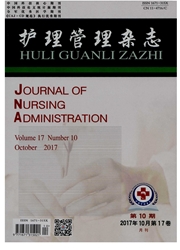

 中文摘要:
中文摘要:
目的探讨首发脑卒中患者出院后1周的社会参与水平及影响因素,为制订针对性的措施提供依据。方法选取符合纳入标准的271例首发脑卒中患者,使用参与和自主性测评问卷在患者出院后1周进行随访调查。结果首发脑卒中患者出院后1周的社会参与总分为(61.14±13.44)分;各维度得分为:家庭角色自主参与(21.69±5.07)分、室外自主参与(15.22±2.55)分、室内自主参与(14.27±4.88)分、社会生活自主参与(9.96±5.50)分。经多元逐步回归分析显示,影响首发脑卒中患者社会参与水平的主要因素是:婚姻状况、照顾者类型、医疗费用支付方式和发病到入院的间隔时间。结论首发脑卒中患者社会参与水平受限,医护人员应根据其影响因素制订针对性的干预措施,以促进其参与社会,提高其生活质量。
 英文摘要:
英文摘要:
Objective To explore the status and influencing factors of first -stroke patients'social participation one week after discharge, thus to provide reference to develop specific measures. Method Totally,271 first - stroke patients were investigated by Impact on Participation and Autonomy Questionaire (IPA) one week after discharge. Results One week after discharge, IPA score of first - stroke patients was ( 51.14 + 13.44) , the scores of each dimension were as the following: family role ( 21.69 ~ 5.07 ), outdoor autonomy ( 15.22 ~ 2.55 ), indoor antnnomy ( 14.27 ~ 4.88 ), social life ( 9.96 + 5.50 ). Multiple linear regression analysis showed that the influential factors of social participation were : marital status, type of caregivers, cost and the time interval between onset to ad- mission. Conclusion The findings of this study demonstrated that the stroke survivors have restriction in social participation. It is important to provide interven- tion measures based on the influencing factors, thus to improve the social participation and quality of life of first - stroke patients .
 同期刊论文项目
同期刊论文项目
 同项目期刊论文
同项目期刊论文
 期刊信息
期刊信息
